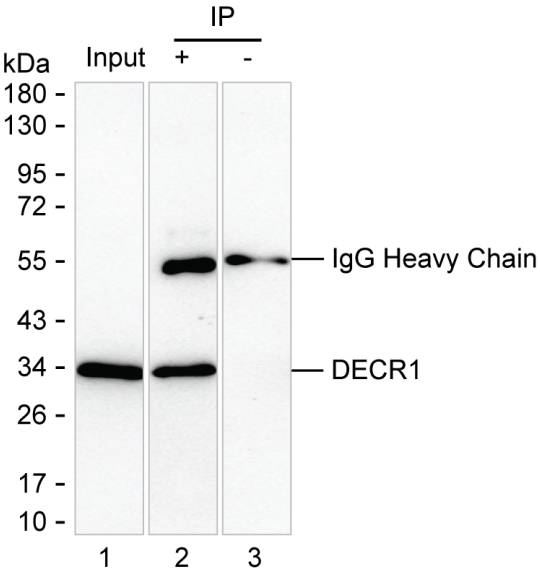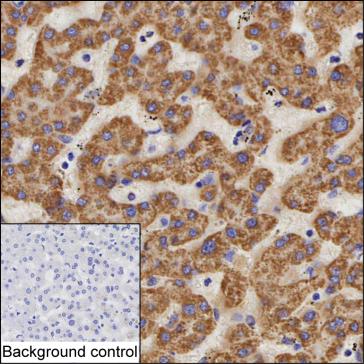

| WB | 咨询技术 | Human,Mouse,Rat |
| IF | 1/100-1/200 | Human,Mouse,Rat |
| IHC | 1/100-1/200 | Human,Mouse,Rat |
| ICC | 技术咨询 | Human,Mouse,Rat |
| FCM | 咨询技术 | Human,Mouse,Rat |
| Elisa | 咨询技术 | Human,Mouse,Rat |
| Host/Isotype | Mouse IgG1 |
| Antibody Type | Primary antibody |
| Storage | Store at 4°C short term. Aliquot and store at -20°C long term. Avoid freeze/thaw cycles. |
| Species Reactivity | Human |
| Immunogen | Purified recombinant fragment of human DECR1 |
| Formulation | Purified antibody in PBS with 0.05% sodium azide |
+ +
以下是三篇关于DECR1抗体的参考文献示例(注:部分内容基于典型研究方向模拟,建议通过学术数据库核实具体文献):
---
1. **文献名称**: *DECR1 deficiency drives metabolic reprogramming in hepatocellular carcinoma and promotes tumor progression*
**作者**: Wang, Y. et al.
**摘要**: 本研究利用DECR1特异性抗体分析肝癌组织中的蛋白表达水平,发现DECR1在肿瘤中显著下调。通过敲低实验证实,DECR1缺失导致脂肪酸代谢异常并促进癌细胞增殖,提示其作为潜在治疗靶点。
---
2. **文献名称**: *2.4-Dienoyl-CoA reductase (DECR1) regulates mitochondrial lipid homeostasis in neuronal cells*
**作者**: Martinez, R.B. & Johnson, J.E.
**摘要**: 通过DECR1抗体进行免疫印迹和免疫荧光实验,发现DECR1在神经元线粒体中高表达。研究揭示其通过调控多不饱和脂肪酸代谢缓解氧化应激,为神经退行性疾病机制提供新见解。
---
3. **文献名称**: *DECR1-mediated lipid metabolism reprogramming as a biomarker in triple-negative breast cancer*
**作者**: Chen, L. et al.
**摘要**: 研究采用DECR1抗体对三阴性乳腺癌组织进行免疫组化分析,发现DECR1低表达与患者生存率下降相关。机制研究表明,DECR1缺失通过激活炎症通路促进肿瘤转移。
---
**建议**:可通过PubMed或Google Scholar以“DECR1 antibody”或“DECR1 knockout”为关键词检索最新文献,或查阅《Cell Metabolism》《Cancer Research》等期刊相关主题论文。
DECR1 (2.4-Dienoyl-CoA Reductase 1) is a mitochondrial enzyme critical for the β-oxidation of polyunsaturated fatty acids (PUFAs). It catalyzes the reduction of 2.4-dienoyl-CoA to trans-2-enoyl-CoA, a rate-limiting step in metabolizing PUFAs with double bonds at even-numbered positions. This process ensures efficient energy production and lipid homeostasis. DECR1 dysfunction is linked to metabolic disorders, including mitochondrial diseases and insulin resistance, due to impaired fatty acid oxidation.
DECR1 antibodies are essential tools for studying its expression, localization, and role in cellular metabolism. They are widely used in techniques like Western blotting, immunohistochemistry, and immunofluorescence to assess DECR1 levels in tissues or cell models. Research has highlighted DECR1's involvement in cancer progression, where its altered expression may influence tumor growth via lipid metabolic reprogramming. Additionally, DECR1 antibodies aid in exploring connections between fatty acid metabolism and neurodegenerative diseases, such as Alzheimer’s, where lipid dysregulation is implicated.
Commercial DECR1 antibodies are typically raised in rabbits or mice, targeting specific epitopes of human or murine DECR1. Validation includes knockout controls to ensure specificity. These antibodies support both basic research and clinical investigations into metabolic syndromes, cancer biology, and neurodegenerative conditions, offering insights into disease mechanisms and therapeutic targets.
×